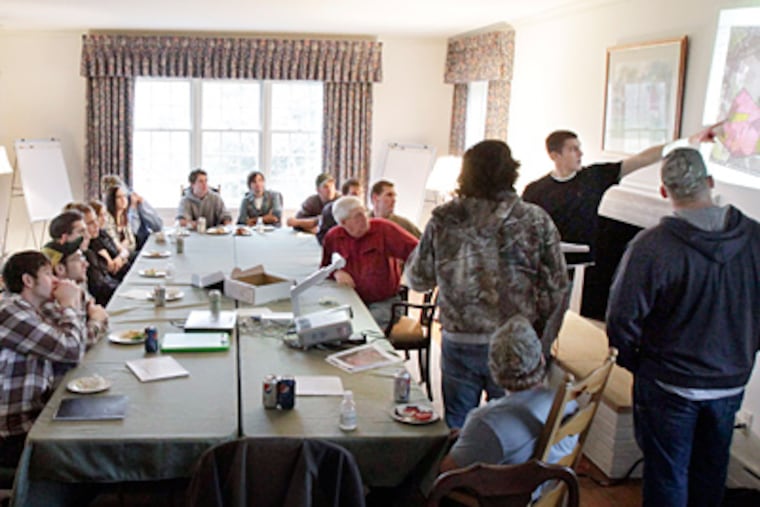'Living laboratory' in Bucks
Hands-on experience for DelVal College students at a donated farm.

Since mid-September, the students in Larry Hepner's soil-morphology field course at Delaware Valley College have left their classrooms behind at the campus near Doylestown for the gently rolling fields about 10 miles away.
There, they hiked through pastures and woods, sifted through soil, and talked about crops.
"Being out here, everything was new to me," said Mykola Kosyk, 21, an environmental-science major from Northeast Philadelphia. "It was very awesome."
Kosyk and his classmates can thank, in part, the man who wrote the nation's tax code in 1954.
Their classroom, such as it is, is a 398-acre farm donated last year as part of a $30 million gift to the college by the heirs of its longtime owners, Kenneth and Helen Gemmill. Kenneth Gemmill, a well-known tax attorney, wrote the tax rules that stood until 1986.
The donation was the college's largest gift ever - and Hepner's students were among the first to experience the natural laboratory on a still-rural slice of central Bucks County.
Hepner, a faculty member in the college's natural resources and biosystems management department, said the new Gemmill Campus provided a great learning opportunity for students.
"They know every inch of the place," said Hepner. "They've walked over the whole thing. That's what's really neat about a soil-mapping class. You really get to understand the land."
Russell C. Redding, dean of agriculture and environmental sciences, said Hepner's course provided a perfect inaugural use of the new campus - but he foresees many different opportunities there, including courses in ecology, environmental design, and wildlife conservation.
"It's a beautiful spot," said Redding. "It's been nice to honor the Gemmill family's intention of having this being used for educational purposes."
The farm, which was valued at about $15 million, was just part of the gift from the family foundation established by the Gemmills in 1961. There was also a $10 million endowment to maintain the farm, in Warwick Township. The final $5 million will go toward the college's goal of becoming a university.
Elizabeth H. "Betsy" Gemmill, the Gemmills' daughter and foundation trustee, said her parents, who died in 1998, would be thrilled with the soil students' trekking over the property. "Both my parents," she said, "were big believers in the power of education."
The college had long been a special place for Kenneth Gemmill, who served on its board for 11 years and was chairman for six.
Gemmill grew up in nearby Ivyland. He served as assistant secretary of the Treasury under President Dwight Eisenhower and, as such, made his contribution to the nation's tax laws.
His wife, Helen, was a Bryn Mawr College graduate who worked for a time as an editor at Vogue magazine and later taught English at Bryn Mawr.
They settled in at Five Spruce Farm in 1956 - about the time DelVal was starting its transformation from an agricultural school to one that today offers 27 majors and three master's programs.
As the soil-morphology class wound down last week, teams of students gave presentations about what they had found on their explorations, as farm manager Doug Christie and three others who help maintain the farm listened.
"I'm glad to see the place being used," said Christie.
Gathered around a large table in what was once the Gemmills' living room, the students described how they had mapped out the various soils on the property and where they figured corn, soybeans, wheat, and hay would grow best.
Christie, a 1967 DelVal graduate, who has managed the farm for 41 years, said the students did a pretty good job of deciding what would grow best in which sections of the farm.
The students said they appreciated the opportunity for a hands-on experience.
"It's a real-world application," said Josh Burnside, 20, an environmental-science major from Quakertown.
Betsy Gemmill, who grew up on the farm and often explored the vast acreage, said the soil wasn't particularly fertile, and she recalled lots of rocks - a point made by several of the students during their presentations.
Gemmill, who now lives in Conshohocken, said she hoped to keep up with what future classes learned there. "I think it's fabulous," she said. "It's a living laboratory."
Jonathan Niehls, 20, a crop-science major, said the experience reminded him of work on his family's 500-acre farm in Barto, Montgomery County, where he planned to work after graduating.
It was fun, he said, to comb through the property and use an auger to extract samples of soil. "It was pretty cool."
His father was an agronomy major who graduated from DelVal in 1982, but, said Niehls, "I don't think he took a course quite like this."